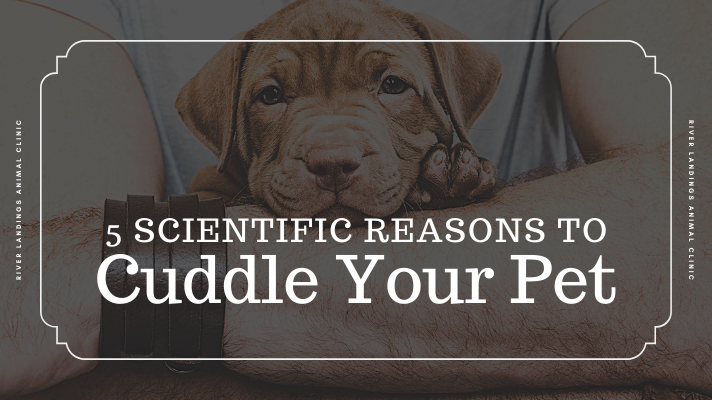When we’re busy with our daily lives, it’s easy to lose track of the things that matter most. Between the stresses of work, social obligations, and an ever-growing to-do list, cuddling with your pet often falls by the wayside.
Next time your dog is smashing their toy into the back of your leg or your cat won’t get off your laptop, don’t brush it off as an annoying inconvenience. Instead, stop what you’re doing and give your furry friend the love and affection it’s craving. Not only is cuddling with your pet a nice thing to do, it’s actually good for both of you! Here are five science-backed reasons why you should work some quality cuddle time into every day.
1. It Can Improve Your Physical Health
Humans and dogs have been together since prehistoric times, and both have a primal need for physical touch. When you cuddle with your dog, it stimulates the brain’s production of Oxytocin (also called the “love hormone”) in both you and your dog. This is the same hormone that is released during childbirth and when a mother breastfeeds her baby. It’s associated with the feelings of trust, empathy, and strong bond formation.
Oxytocin also inhibits cortisol production. High levels of this stress-hormone can lead to weight gain, reduced immune function, and an array of other problems. Cuddling with your pet can lower your heart rate, reduce your blood pressure, and may even stimulate muscle regeneration.
2. Cuddling Makes Your Pet Feel Loved and Secure
Dogs are pack animals that naturally want to bond with others. While cats are known for being fiercely independent, they too sometimes crave human touch. Giving your pet plenty of affection empowers it and makes it feel loved and secure.
Lack of affection from their human owners can cause dogs to become inactive, withdrawn, and change their eating patterns. It’s hard to tell if dogs feel sadness and depression in the same way humans do, but many vets agree there are times when that’s the only explanation for a pet’s change in behavior. If your pet is acting strange, a trip to the vet is definitely in order, but some extra cuddling also can’t hurt.
3. It Helps Relieve Anxiety and Depression
Cuddling stimulates the release of the neurotransmitters dopamine and serotonin, which help relieve depression and may make you feel happier. The act of holding and stroking your pet is also an effective way to combat anxiety. It creates a calming effect and helps you focus on the present moment.
When we’re constantly busy and on the go, we can start to feel guilty about not paying enough attention to our pets. Setting aside a few minutes each day to cuddle and bond can alleviate this guilt and help you maintain a positive mental balance.
4. Regular Physical Contact Helps You Stay in Tune with Your Pet’s Health
Daily physical contact with your pet makes it more likely that you’ll notice right away when something is wrong. While you’re stroking your pet, take notice of any new lumps or bumps, unpleasant smells, or areas that seem sensitive or tender.
Your pet can’t verbally tell you when something’s wrong, so the more in-tune you are with your pet’s body, the faster you can get them the medical attention they might need.
5. Snuggle-Sessions Are the Best Way to Start and End Your Day
Cuddling with your dog for 10 minutes before you get out of bed in the morning can help you feel calm, relaxed, and happy. Use this morning cuddle-time to get your mindset right and the positive vibes will flow through to the rest of your day.
A before-bed cuddle-session can also help you relax and let go of whatever happened throughout the day. It can promote feelings of restfulness and help you get a better night’s sleep.
How to Cuddle With Your Pet the Right Way
If you haven’t been regularly cuddling with your pet, take it slow. Not all dogs and cats like to snuggle, and some prefer a gentler approach. Pay attention to body language and don’t push it if they’re not into it.
Some pets prefer that you show your affection in other ways like going for walks, playing with toys, or simply spending time in close proximity without physical touch. No matter how you choose to do it, spending some time every day focusing your energy on your pets will strengthen your bond and keep both of you happier and healthier.
Hear From Us Again
Don't forget to subscribe to our email newsletter for more recipes, articles, and clinic updates delivered straight to your e-mail inbox.
Related Categories:





